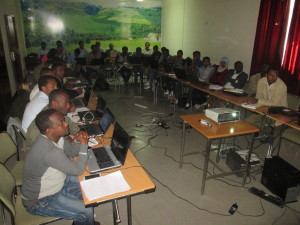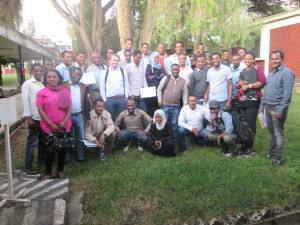Ethiopian Institute of Agricultural Research (EIAR), Addis Ababa, Ethiopia
23-25 November 2015.
During the last week in November, 32 staff members from the Ministry of Agriculture (MoA), the Ethiopian Institute of Agricultural Research (EIAR), and five regional research institutes participated in a three-day impact evaluation training course provided by ESSP in collaboration with EIAR. Eight senior and junior researchers from ESSP delivered practical training on STATA software, as well as covering the theoretical side of impact evaluation methodologies, in order to build capacity in this important area that affects many research activities. The training was hosted by the EIAR at the EIAR Campus.
 One of ESSP’s cornerstones is to build capacity in Ethiopia through demand driven regular training events for different target audiences. As part of such efforts, ESSP received a joint request from the Ministry of Agriculture (Natural Resources Directorate) and EIAR to organize this training course. ESSP recommended that experts from regional agricultural research institutes should be included in the event to encourage more widespread distribution of skills through knowledge sharing.
One of ESSP’s cornerstones is to build capacity in Ethiopia through demand driven regular training events for different target audiences. As part of such efforts, ESSP received a joint request from the Ministry of Agriculture (Natural Resources Directorate) and EIAR to organize this training course. ESSP recommended that experts from regional agricultural research institutes should be included in the event to encourage more widespread distribution of skills through knowledge sharing.
From the feedback received following the 3 days of intensive theoretical and practical training, the majority of participants experienced exposure to new information and knowledge, gained practical experience with new software, and benefitted from the expertise of ESSP researchers at using different impact evaluation methodologies applied in research. 95 percent were satisfied or highly satisfied with the course and indicated an appropriate balance between lectures and practical activities (86 percent were highly satisfied or satisfied with the balance). Some participants commented on the limited time to fully internalize some of the new concepts.
Compared to similar courses, this Impact Evaluation Training course was rated very highly with respect to meeting and exceeding expectations. In particular, the components that received the greatest positive acclaim were the practical exercises. Learning by doing is viewed by ESSP as the most valuable way to instill new skills, therefore the strong practical emphasis during this training was clearly appreciated from the feedback, in addition to the quality of training delivery.
ESSP seeks to foster close collaboration with government institutes, and this event potentially opens opportunities to work together more closely in the future. From the feedback, ESSP’s ‘best practice’ methodological approach to impact evaluation appears to have been understood and internalized by the majority of participants. The training therefore seems to have laid a good foundation for those who may be engaged in impact evaluation of institutional and/or government projects.
